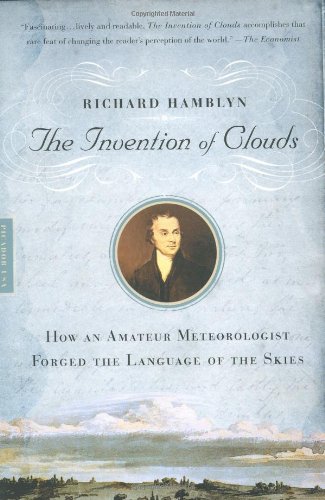Review: The Invention of Clouds by Richard Hamblyn
You call the wispy high clouds of the December sky “cirrus”. So does the German, Spaniard, Russian, Afrikaner… We have a common language for speaking of clouds due to a remarkable Quaker chemist, Luke Howard, who codified and named clouds (in Latin, the scientific language then and now) according to the behavior he had observed.
In The Invention of Clouds, Richard Hamblyn tells us not only about the life, times and work of this amateur meteorologist, but also about his remarkable colleagues in science.
Howard lived in London at the end of the 18th century, when the intellectual life of Europe was aboil with new theories of natural philosophy—science—and young intellectuals found their way to the coffee-house to debate their favorites in a heady atmosphere of stock trading, tobacco-smoking, drug experimentation and science.
The Royal Society was nearly one hundred years old, and was essentially closed to the Quaker Howard. In any case, it was the society for “old fogies”; the coffee-house set formed dozens of societies of their own. Howard was “discovered” by Alexander Tilloch, a Scottish-born publisher and magazine editor, who then introduced his work to the Askesian Society, a group founded by three Quakers specifically as a debating club. The Askesians preferred a more interactive inquiry than the sedate Royal Society functions. Howard’s first presentation of “On Modifications of Clouds” was made in this hurly-burly venue.
Hamblyn makes clear that it is not only Howard’s work that is seminal in this tale. The birth of the scientific journal (Alexander Tilloch), the explosion of interest in science (the Askesian and other societies), the growth of the stock trade as a basis for endeavor, even the rise of the naturalist school of painting, all have their place.
Altogether, The Invention of Clouds is a thoroughly fascinating glimpse of the transformational second wave of communication. For those of us surfing the third wave, it has a strongly familiar flavor.
Howard lived in London at the end of the 18th century, when the intellectual life of Europe was aboil with new theories of natural philosophy—science—and young intellectuals found their way to the coffee-house to debate their favorites in a heady atmosphere of stock trading, tobacco-smoking, drug experimentation and science.
The Royal Society was nearly one hundred years old, and was essentially closed to the Quaker Howard. In any case, it was the society for “old fogies”; the coffee-house set formed dozens of societies of their own. Howard was “discovered” by Alexander Tilloch, a Scottish-born publisher and magazine editor, who then introduced his work to the Askesian Society, a group founded by three Quakers specifically as a debating club. The Askesians preferred a more interactive inquiry than the sedate Royal Society functions. Howard’s first presentation of “On Modifications of Clouds” was made in this hurly-burly venue.
Hamblyn makes clear that it is not only Howard’s work that is seminal in this tale. The birth of the scientific journal (Alexander Tilloch), the explosion of interest in science (the Askesian and other societies), the growth of the stock trade as a basis for endeavor, even the rise of the naturalist school of painting, all have their place.
Altogether, The Invention of Clouds is a thoroughly fascinating glimpse of the transformational second wave of communication. For those of us surfing the third wave, it has a strongly familiar flavor.
Liner Notes:
- Other books of interest about this period are The Lunar Men by Jenny Uglow, about this Birmingham science society of Luke Howard’s day (which included James Watt, Matthew Boulton and Charles Darwin’s grandfather Erasmus); and A Conspiracy of Paper by David Liss, a fictional account of the coffee-house trade in stocks in the mid-1700s.
- Lunar Men is not available for Kindle, but the other two are.

No comments:
Post a Comment